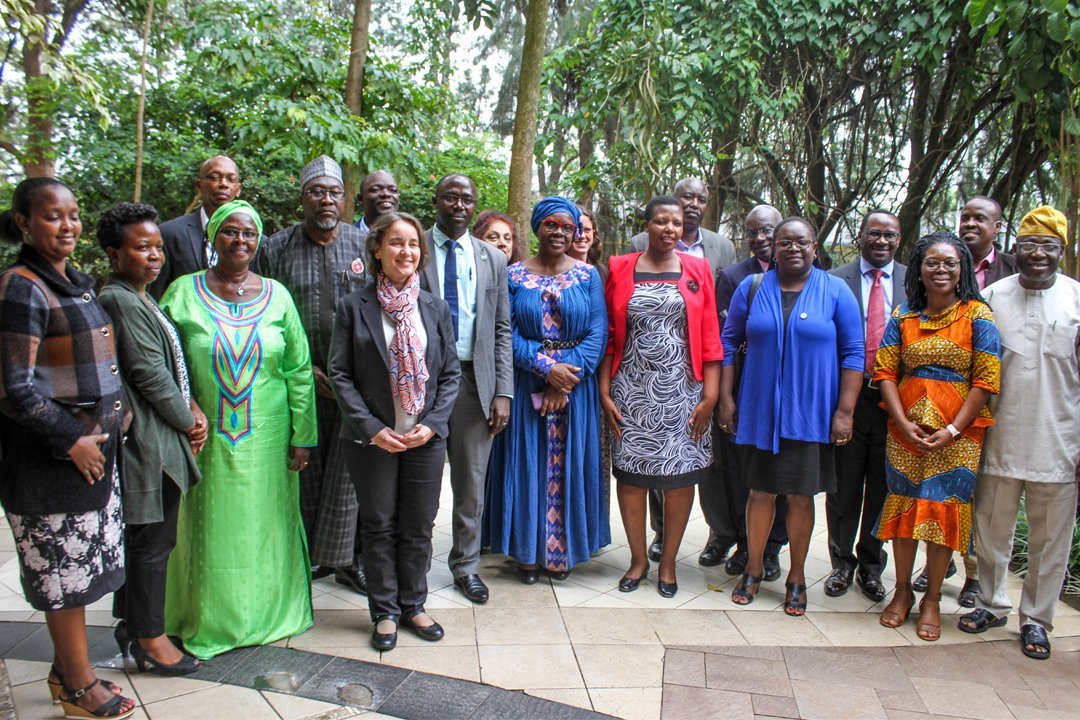Six Anglophone African countries participating in the regional seminar organized by ADEA and AU adopt the Continental Book and Reading Policy Framework

Abidjan (Côte d’Ivoire) 13th December 2019 – A technical seminar on national book and reading policies (NBRP) in Africa involving six countries just ended in Kigali (Rwanda), where it saw the adoption of the African Union (AU) Continental Book and Reading Framework and where a customized tool kit that will provide a road map on policy formulation was agreed upon. The Association for the Development of Education in Africa (ADEA), the United States Agency for International Development (USAID) through the Global Book Alliance (GBA) and the African Union Commission (AUC) – in close collaboration with the Ministry of Education of Rwanda and thanks to the support of Save the Children – have partnered to support quality education for national development through sustained and improved literacy. The seminar was organized by ADEA’s Books and Learning Materials (BLM) section of the Inter-Country Quality Node on Teaching and Learning (ICQN-TL) and it was held at the Serena hotel in Kigali from 9th to 10th December.
The Seminar is a logical follow up to the high level workshop – held in Nairobi in June 2019 – on National Book and Reading Policies for Africa, which validated the AU Continental Book and Reading Policy Framework, intended to support quality education for national development, and the attainment of the 2030 Agenda in particular the Sustainable Development Goal (SDG) 4, the Continental Education Strategy for Africa 2016-2025 (CESA 16-25) and Africa’s Agenda 2063.
The seminar was opened by Ms. Angelique Tusiime Deputy Director General of Rwanda Education Board (REB) who highlighted the importance of adopting a common framework on national book and reading policies saying that they are ready to work with ADEA to ensure that they become the model for Africa by being the first country to formulate and endorse their national book and reading policy.
The seminar held in Kigali popularized the framework to the six participating countries (i.e. Cameroon, Ghana, Kenya, Nigeria, Rwanda and Uganda) and urged them to adopt and buy-in to the continental framework to guide the development of national book and reading policies in their respective countries. Thirty-five (35) participants drawn from ministries of education, UNESCO, International Publishers Association (IPA), African Publishers Network (APNET), Save the Children Rwanda, Worldreader as well as local writing, publishing, bookselling, library and education sectors were taken through the process of developing national book and reading policies, and they endorsed the continental framework for this purpose. It was also reaffirmed that it will be important to agree on regional and continental policies in view of the Continental Free Trade Area, and to strengthen intra African partnership, mutual learning and collaboration.
The Seminar was closed by Mr. Samuel Mulindwa, Permanent Secretary of the Ministry of Education of Rwanda who revealed that Rwanda is ready for book and reading policy formulation and will take seriously all the resolutions made because they recognize the role books play in national development.
ADEA will continue to actively collaborate with the African Union Commission and other key partners at the country level to advocate for the adoption of the Continental Framework for National Book and Reading Policies, and support the formulation of the respective national policies.
For more information, please contact:
- Lily Nyariki, ICQN-TL’s Focal Point of the Books and Learning Materials section (Anglophone countries), T. (+254) 73.3 7.12.117 / (+254) 70.65.69.707, lmnyariki@gmail.com / l.nyariki@adeanet.org
Media:
- Stefano De Cupis, Senior Communications Officer, ADEA, T. (+225) 20.26.42.61, s.decupis@afdb.org
About ADEA
The Association for the Development of Education in Africa (ADEA) is the voice of education in Africa and a key network of Education Ministries. It plays a significant role in the education space as a convener, knowledge creator and forum for policy dialogue, working through its Inter-Country Quality Nodes (ICQNs) and the Task Force on Education Management and Policy Support. ADEA contributes to the empowerment of African countries to develop quality education and training systems that respond to the countries' emergent needs and drive social and economic transformation sustainably.
About ICQN-TL-BLM
The ADEA’s Books and Learning Materials section (BLM) of the Inter-Country Quality Node on Teaching and Learning (ICQN-TL) is committed to supporting processes conducive to formulating adequate national book policies that improve the provision of good quality educational materials, effective schooling, and literacy across Africa. It strives to accomplish this by calling on governments, the private sector, development agencies, and civil society to consider a holistic approach that includes substantial input from African partners to achieve viable book policies.
About AU
Africa Union’s objective is to rid the continent of the remaining vestiges of colonization and apartheid; to promote unity and solidarity among African States; to coordinate and intensify cooperation for development; to safeguard the sovereignty and territorial integrity of Member States and to promote international cooperation within the framework of the United Nations. As a continental organization, AU provides an effective forum that enables all Member States to adopt coordinated positions on matters of common concern to the continent in international fora and defend the interests of Africa effectively.
About GBA
The Global Book Alliance is an international effort involving multiple stakeholders working to transform book development, procurement, distribution, and use to ensure that no child is without books. Its mission is to guarantee that children everywhere have the books and learning materials they need to learn to read and read to learn. New and innovative solutions are needed to solve the learning crisis, and the Global Book Alliance is taking the lead on identifying and implementing these solutions.